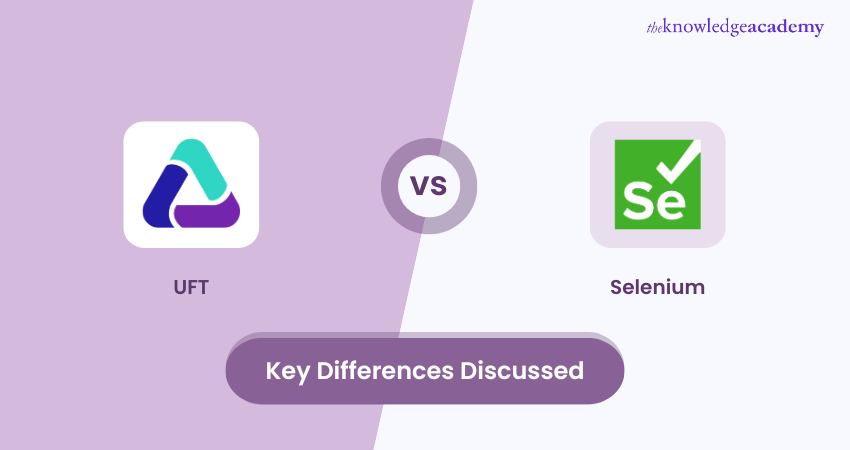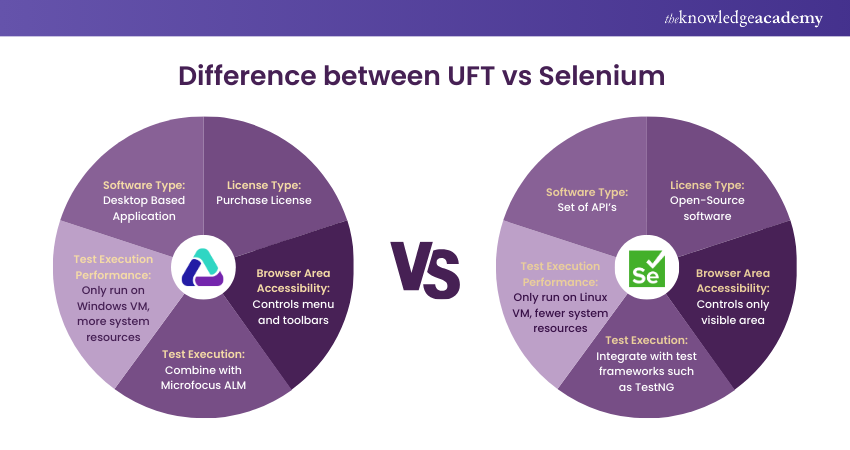We may not have the course you’re looking for. If you enquire or give us a call on +48 221041849 and speak to our training experts, we may still be able to help with your training requirements.
Training Outcomes Within Your Budget!
We ensure quality, budget-alignment, and timely delivery by our expert instructors.

Manual Testing of any web-based and desktop applications takes a lot of time, capital, and resources. For this reason, automation has come into place to reduce or eliminate Manual Testing challenges as much as possible. There are many tools to automate desktop and web-based applications, Selenium and Unified Functional Testing (UFT) being two of them. The debate on UFT vs Selenium has increased significantly in recent years.
While Selenium is an open-source Testing Tool, Unified Functional Testing (UFT) is a commercial product that needs a licence. Learn in detail about UFT vs Selenium through this blog. Also, explore how these two can be helpful in reducing manual labour.
Table of Contents
1) What is Unified Functional Testing (UFT)?
2) What is Selenium?
3) Comparison of UFT vs Selenium
a) Software type
b) Type of license
c) Accessibility of browser area
d) Execution of tests
e) Performance of test execution
f) Technology supported
g) Coding skills
h) Programming language
i) Performance testing capabilities
4) Conclusion
What is Unified Functional Testing (UFT)
UFT is an automation tool used to perform functional testing quickly. Mercury Interactive developed the original version, which was later taken over by HP and called Quick Test Professional (QTP).
HP then sold it to Micro Focus, which is now called UFT. Due to its embedded Artificial Intelligence (AI)—based capabilities, this tool offers intelligent test automation for mainframe, desktop, web, mobile, composite, and packaged enterprise-grade apps.

What is Selenium?
Selenium is an open-source software tool that automates the tests performed on web browsers. This tool is considered one of the easiest tools for automating the tests of web-based applications.
The major benefit of Selenium is that it can support multiple programming languages such as .NET, Ruby, Pearl, PHP, Java, and JavaScript for writing test cases, with the combination of Selenium with Java being the most common. It has the flexibility to allow the testing teams to work with programming languages they find comfortable.
In addition, it implements test cases using those languages. Its services can also be accessed from different Operating Systems (OS) like Windows, Linux, and Solaris OSX. Because this tool is more simple to learn, many testing teams use it. Learning the Prerequisites of Selenium can help you understand this web automation tool better.
Comparison of UFT vs Selenium
In the above sections, we gave you a basic introduction to both UFT and Selenium. After reading them, you might be confused about which tool is best for you and how to select a tool that best suits your requirements. Don’t worry; we will compare the differences between UFT and Selenium tools below:

Software type
UFT is desktop-based application software that provides a comprehensive environment for automated functional and regression testing. It is designed to automate user actions on web and client-server applications, identifying bugs through these interactions. In comparison, Selenium is an open-source suite of tools primarily used for automating web browsers. It allows test scripts to be written in various programming languages and executed across browsers
Type of license
UFT is a proprietary tool that needs to be paid for, so, if you want to use in production with multiple users the cost can be significant. However, on the other hand, Selenium is free and open-source. This allows users to use it with no incurring license fees for test automation. Selenium is one of those open-source (free) Software Testing Tools.
Accessibility of browser area
UFT has the capability to interact with the entire browser interface, including menus, toolbars, and other elements outside the webpage’s content. In contrast, Selenium focuses on automating tasks within the visible area of the web page loaded in the browser without control over the browser’s native components.
Execution of tests
UFT integrates with Micro Focus ALM for managing and executing test cases, which adds to the cost as ALM is also a paid product. On the other hand, Selenium can run tests concurrently by integrating with various free test frameworks like TestNG, JUnit, or PyTest, offering flexibility and reducing costs.
Performance of test execution
UFT is limited to Windows OS and requires more system resources, which can lead to higher maintenance and operational costs. On the other hand, Selenium is lighter on system resources and can run on multiple OS, including Linux, which is known for its efficiency and lower resource consumption.
Technology supported
UFT only supports Windows Operating Systems and it consumes more system resources, which results in extra maintenance and operational costs. On the contrary, Selenium is less intensive on system resources and is able to work with several OS, such as Linux, which is well known for efficiency and less resource consumption.
Coding skills
UFT has keyword-driven testing and strong record-and-playback capabilities. Thus, it requires less complex programming knowledge and eliminating the need for coders among testers. In comparison, Selenium is a framework that requires the users to be proficient in programming concepts, since test scripts need to be written in supported programming languages.
Programming language
VBScript is the only language supported by UFT and that may be a limitation if a team would like to use OOP in their tests. Contrastingly, Selenium comes with built-in support for multiple OOP languages such as Java, C#, Python, and Ruby that contribute to the flexibility and possibility to use advanced programming techniques.
Performance testing capabilities
UFT can simulate user actions for performance testing when used with LoadRunner, another Micro Focus product requiring a separate license. While Selenium is not inherently designed for performance testing but can be combined with tools like JMeter or WebLoad to execute performance tests using Selenium scripts.
Sign up for the Selenium Testing Framework Training now to understand how to set up a browser driver to automate your driver.
Conclusion
After reading this blog, you may have now learned the key differences between UFT vs Selenium, and with these differences, you can choose either UFT or Selenium based on your project requirements. If you have a project budget and can afford UFT, go for it, as it provides various features. If your project has a lesser budget, go ahead with Selenium, but you must put in more effort.
Sign up for the Selenium WebDriver With Python Training course now to learn how to acquire the knowledge and skills required to integrate Python with Selenium.
Frequently Asked Questions

UFT is one of the most used test automation technologies among large companies for large-scale software and systems tests. Its support for an extensive range of applications and environments means that it remains in-demand in the industry.

The reason why testers lean towards Selenium, which is open-source, instead of QTP is due to the fact Selenium supports multiple programming languages, is compatible with various browsers and operating systems, providing greater flexibility and cost-effectiveness.

The Knowledge Academy takes global learning to new heights, offering over 30,000 online courses across 490+ locations in 220 countries. This expansive reach ensures accessibility and convenience for learners worldwide.
Alongside our diverse Online Course Catalogue, encompassing 17 major categories, we go the extra mile by providing a plethora of free educational Online Resources like News updates, Blogs, videos, webinars, and interview questions. Tailoring learning experiences further, professionals can maximise value with customisable Course Bundles of TKA.

The Knowledge Academy’s Knowledge Pass, a prepaid voucher, adds another layer of flexibility, allowing course bookings over a 12-month period. Join us on a journey where education knows no bounds.

The Knowledge Academy offers various Selenium Training, including Selenium Immersion With C#, Selenium Testing Framework and Selenium WebDriver With Python Training. These courses cater to different skill levels, providing comprehensive insights into Selenium Send Keys.
Our Programming and DevOps Blogs cover a range of topics related to Java, offering valuable resources, best practices, and industry insights. Whether you are a beginner or looking to advance your Selena Testing skills, The Knowledge Academy's diverse courses and informative blogs have you covered.
Upcoming Programming & DevOps Resources Batches & Dates
Date
 Selenium WebDriver with Python Training
Selenium WebDriver with Python Training
Fri 10th Jan 2025
Fri 14th Mar 2025
Fri 9th May 2025
Fri 11th Jul 2025
Fri 12th Sep 2025
Fri 14th Nov 2025







 Top Rated Course
Top Rated Course


 If you wish to make any changes to your course, please
If you wish to make any changes to your course, please


